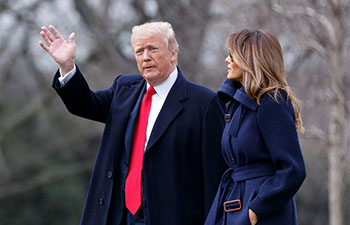WASHINGTON, March 19 (Xinhua) -- The U.S. Department of Commerce has started accepting the domestic industry's product exclusion requests from the recently announced tariffs on steel and aluminum imports on Monday, according to a rule published by the department.
The interim final rule, published on the government official journal Federal Register and formally effective on Monday, outlines the procedures for the U.S. industry to seek such exclusions.
Approved exclusions will be made on a product basis by the Commerce Department and will be limited to individuals or organizations that submitted the specific exclusion request, according to the rule.
"These procedures will allow the Administration to further hone these tariffs to ensure they protect our national security while also minimizing undue impact on downstream American industries," U.S. Secretary of Commerce Wilbur Ross said in a statement.
It is estimated that the department will receive steel tariff exclusion requests from 4,500 applicants and aluminum tariff exclusion requests from 1,500 respondents, according to Politico, a U.S. political website.
However, the Office of the U.S. Trade Representative has not informed the public how countries can be excluded from those tariffs, the report said.
The move came after the Trump administration's announcement of a 25 percent tariff on imported steel and a 10 percent tariff on imported aluminum earlier this month, which would formally take effect on Friday.
The unilateral tariff plan has sparked widespread criticism and opposition among U.S. business groups and global trading partners, which argued that the tariffs would hurt American consumers, businesses and the overall economy.
A recent study by the Trade Partnership, a Washington D.C.-based consulting firm, estimated that Trump's new tariffs on steel and aluminum would result in a net loss of nearly 470,000 U.S. jobs after accounting for positive impacts on U.S. steel and aluminum producers. In other words, more than 18 jobs would be lost for every one gained.
Past experience has also shown that such tariffs will likely raise costs for American consumers, hurt American downstream industries that use metals, and cost thousands of jobs in other manufacturing and services sectors.















